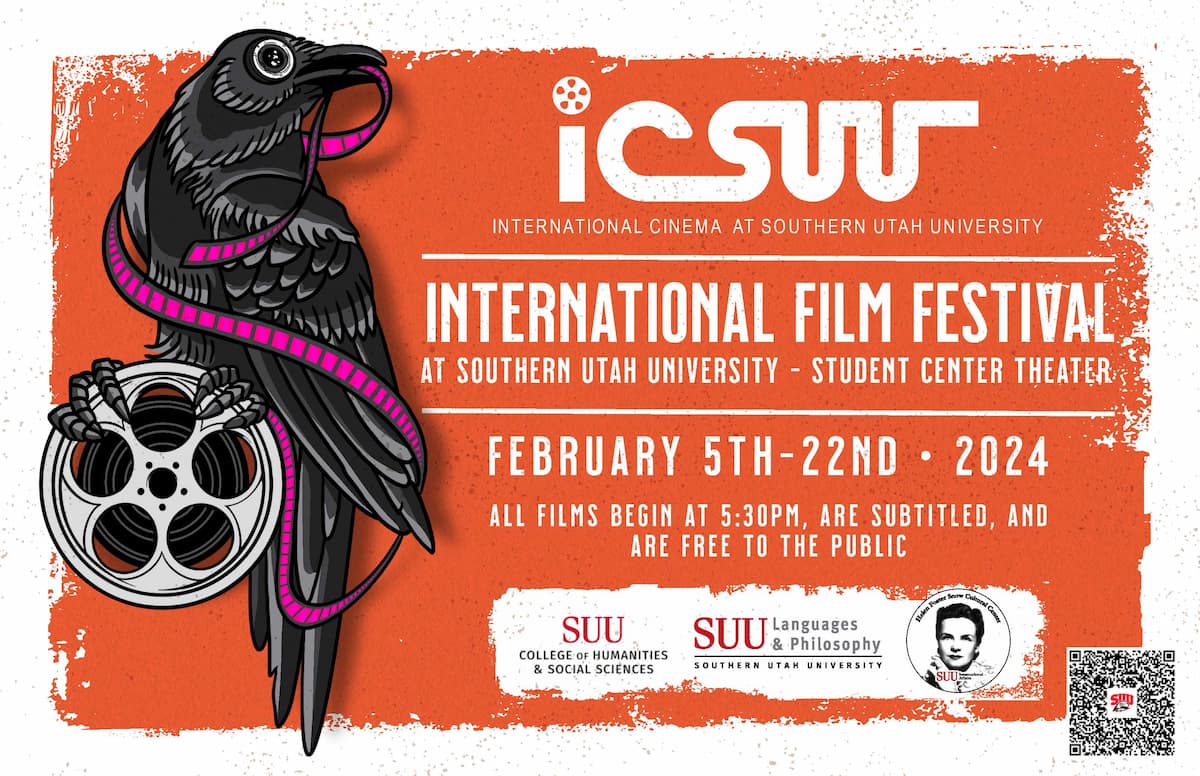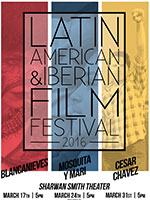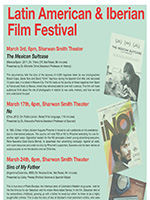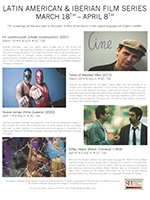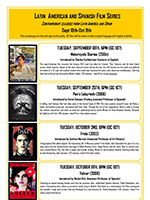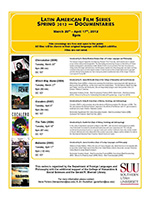Languages & Philosophy Film Festivals Archive
The Languages & Philosophy department has offered a few versions of film festivals throughout the years. Here is an archive of some items we've done in the past.
International Film Festival (2017-Present)

2019 International Film Festival
January 28 - February 13, 2019
- January 28: Siete Cajas (Seven Boxes)
- January 30: Ouvrir la voix! (Speak Up!)
- February 4: Rabbit a la Berlin (Mauerhase, Królik po berlinsku) (2009)
- February 6: Heart of the Andes (2012)
- February 11: The Workshop (2017)
- February 13: Das Leben der Anderen (The Lives of Others)

2018 International Film Festival
Monday, January 29th (5 p.m.): Dolores

2017, Dir. Peter Bratt, English and Spanish with English subtitles, 98 min. Introduction and post-screening discussion led by Dr. Matthew Eddy, Associate Professor of Sociology.
Dolores Huerta is among the most important, yet least known, activists in American history. An equal partner in co-founding the first farm workers unions with Cesar Chavez, her enormous contributions have gone largely unrecognized. Dolores tirelessly led the fight for racial and labor justice alongside Chavez, becoming one of the most defiant feminists of the twentieth century and she continues the fight to this day, at 87. With intimate and unprecedented access to this intensely private mother to eleven, the film reveals the raw, personal stakes involved in committing one's life to social change.
Wednesday, January 31st (5 p.m.): After Winter Comes Spring (Winter Adé)

1988, Dir. Helke Misselwitz, German with English subtitles, 115 min. Introduction and post-screening discussion led by Dr. Kelly Kathleen Ferguson, Assistant Professor of English.
Shortly before the collapse of the GDR (German Democratic Republic, i.e. East Germany), filmmaker Helke Misselwitz traveled by train from one end of the country to the other interviewing East German women of different ages and backgrounds. In this documentary masterpiece, women reveal their personal and professional frustrations, hopes and aspirations--and, in doing so, paint a portrait of a changing society. The landscape and architecture of East Germany, filmed in black and white on 35mm by Thomas Plenert, form the background to the personal narratives that Misselwitz presents.
Saturday, February 3rd (2 p.m.): The Unknown Girl (La fille inconnue)

2016, Dirs. Jean-Pierre Dardenne, Luc Dardenne, French with English subtitles, 113 min. Introduction and post-screening discussion led by Dr. Julie McCown, Assistant Professor of English.
This new film from acclaimed directors the Dardenne brothers (Two Days, One Night) is a searing saga of guilt and redemption. One evening after work hours, Jenny (Adèle Haenel), a young doctor, allows the door buzzer at the small clinic where she works to go unanswered. It's only later that she learns that the person ringing was an unidentified African woman found dead shortly after by the side of a road. Consumed by the thought that she is to blame, Jenny embarks on an obsessive crusade to discover who the anonymous woman was and to see to it that she is not forgotten. Shot through with low-key suspense and the heart-stopping realism that has become the directors' trademark, The Unknown Girl is both a gripping mystery and a profoundly human moral tale.
Monday, February 5th (5 p.m.): The Drifter (Eine flexible Frau)

2010, Dir. Tatjana Turanskyj, German with English subtitles, 97 min. Introduction and post-screening discussion led by guest speaker, Dr. Hester Baer, Associate Professor of German Film Studies & Women's Studies at the University of Maryland, College Park.
"The Drifter" deals with the question of the identity-donating meaning of work. Greta M., 40, a woman with a postmodern, fragile architect's biography, loses her job. She is later fired after trying to work in a call center. Like Don Quichotte, she fights against uncanny powers: her son, "the dangerous maternity", the job coach, the suffocating architecture of new Berlin (gated communities, social town borders) and not least against her own paranoia and fear of becoming a woman without order. Greta drinks and drifts between adaptation and contradiction through her life. On this tour de force between the call center, searching for work, the job center, her life coach, architecture offices, her son's school, and bars, the protagonist drifts through Berlin's outskirts and arrives at the "town of women". The meetings are snapshots of modern women's lives. Only the old Hölderlin expert Dorothea is able to donate consolation, and young Chinese show the future of work and architecture. The plot frees itself of generic convention to highlight experience.
This screening is co-sponsored by the SUU Grace A. Tanner Center for Human Values and the Women and Gender Studies Program.
Please join us for a Dinner and Dialogue (hosted by the SUU Grace A. Tanner Center for Human Values) featuring Hester Baer in the Starlight Room of the Student Center at 7:00. This dinner and dialogue will follow a screening of "The Drifter" at 5:00 in the Student Center Theater. This event is free and open to the public but space is limited so register early on the Tanner Center website.
Wednesday, February 7th (5 p.m.): I Don't Belong Anywhere - The Cinema of Chantal Akerman

2015, Dir. Marianne Lambert, French with English subtitles, 67 min. Introduction and post-screening discussion led by Dr. Todd Petersen, Professor of English.
I Don't Belong Anywhere - The Cinema of Chantal Akerman explores some of the Belgian filmmaker's 40 plus films, and from Brussels to Tel Aviv, from Paris to New York, it charts the sites of her peregrinations. An experimental filmmaker, a nomad, Chantal Akerman shared with Marianne Lambert her cinematic trajectory, one that never ceased to interrogate the meaning of her existence. And with her editor and long-time collaborator, Claire Atherton, she examines the origins of her film language, and aesthetic stance.
Saturday, February 10th (2 p.m.): Violeta Went to Heaven (Violeta se fue a los cielos)

2011, Dir. Andrés Wood, Spanish and French with English subtitles, 1h 10m. Introduction and post-screening discussion led by Dr. Lynn Vartan, Associate Professor of Music & SUU A.P.E.X. Director.
An unconventional biography of a deeply influential figure in world music and complex cultural icon of Chile's history, Violeta Went to Heaven stars Francisca Gavilán as Violeta Parra, treasurer and guardian of Chile's deepest musical traditions and a woman of intense contradictions and unique genius. A singer, songwriter, author, poet, painter, and ethnomusicologist, Parra rescued a forgotten traditional culture, traveling throughout Chile to research Chilean traditional music, collecting songs and lyrics for an unprecedented project of recovery and revival that sparked a Latin American folk music movement, the nueva canción.

2017 International Film Festival
February 6 - School of Babel
February 6 at 5pm
Sharwan Smith Theater
"School of Babel" will be the first of six films shown as part of our film festival. It is a documentary by director Julie Bertuccelli. It came out in 2015. It is a film about a school program in Paris created for newly arrived immigrant children to learn French before being placed in a regular classroom. The film humanizes the current debate about immigration, showing children from many different countries and religious backgrounds struggling to learn French well enough to be placed in regular classes. Themes include integration, human beings' ability to find common ground despite enormous differences, diversity and multiculturalism. After we view the film, a teacher at a local Montessori school, Erin Waldman, has agreed to animate a discussion with audience participation.
February 8 - Las Marthas
February 8 at 5pm
Sharwan Smith Theater
The second film of our festival, "Las Marthas," was chosen as one of NBC's Top Ten Latino Films to Watch in 2014 and had its national broadcast on PBS' Independent Lens in February of 2014. The feature-length documentary was made by Cristina Ibarra, the award-winning Chicana filmmaker. It follows two young Mexican-American women as they prepare for their debut at a debutante ball hosted by the Society of Martha Washington in Laredo, Texas. We have invited Ibarra to come to SUU, she will be present for the screening, introduce the film and conduct the Q & A afterwards.
February 9 - SUU Convocation by Christina Ibarra
February 9 at 11:30am
Gilbert Great Hall
The highlight of this year's film festival is the visit of the Chicana filmmaker, Cristina Ibarra. She has made several films, including "Love & Monster Trucks," which was a Semi-Finalist at the 2009 Sundance Screenwriters Lab and an Official Selection at the 2010 Iberamerican Films Crossing Borders, at the Guadalajara Film Festival & Market. Her resume also includes speaking engagements at other universities and service on panels and film juries. Ibarra will address SUU's students, faculty and staff at a Convocation on the day after the viewing of her documentary "Las Marthas."
February 10 - The Murderers Are Among Us
February 10 at 5pm
Sharwan Smith Theater
Our third selection will be "The Murderers Are Among Us," a 1946 German-language film by director Wolfgang Staudte. This groundbreaking film helped shape the development of postwar German-language cinema. It was the first feature film produced in Germany after World War II and established the new postwar genre of the "rubble film"--movies filmed in the ruins of bombed-out German cities. As such, this film offers viewers an eyewitness glimpse of what the streets and buildings of Berlin actually looked like in 1945. Constructed as a dialogue between a concentration camp survivor and a military doctor tortured by the guilt of having witnessed the deaths of countless innocent people at the orders of unethical superiors, "The Murderers Are Among Us" was one of the first films to address wartime trauma and questions of guilt associated with Nazi war crimes. Themes include memory, coping with personal and collective trauma, and rebuilding.
February 13 - Balzac and the Little Chinese Seamstress
February 13 5pm
Sharwan Smith Center Theater
"Balzac and the Little Chinese Seamstress" is a 2002 film by Chinese director Sijie Dai, who has lived in France since the 1980s, the film is based on his own life. It tells of two young men sent to the country during the Cultural Revolution in China to be reeducated by hard labor. They fall in love with a young seamstress and each attempt to make her fall in love with them, using their knowledge of classic western literature such as the works of Honoré de Balzac. Its central theme is the power of books, and their connections to love, pleasure and the individual, which is strikingly in opposition with the anti-intellectual environment of the Cultural Revolution in China. We have invited a visiting Chinese scholar, Dr. Qingping Liu, who currently teaches Mandarin at SUU, to introduce the film and lead the discussion afterwards.
February 15 - The Club
February 15 at 5pm
Sharwan Smith Center Theater
Our second Spanish-language selection is the 2015 film "The Club," by director Pablo Larrain. In the film, the Catholic Church sends a counselor to a small Chilean town where disgraced priests, suspected of crimes ranging from child abuse to taking babies from unwed mothers, live in seclusion, under the supervision of a former nun. The film won the Jury Grand Prix at the 65th Berlin International Film Festival. Themes include human rights, religion and spirituality, international politics, Latin American history, bullying and violence, health and aging. Dr. Kris Phillips, professor of philosophy at SUU, will present the film and lead the post-screening discussion. We chose Dr. Phillips for this role because of his expertise in the area of ethics.
February 17 - Phoenix
February 17 at 5pm
Sharwan Smith Center Theater
The final film in our festival schedule is Christian Petzold's 2014 "Phoenix." This film tells the story of a German-Jewish Holocaust survivor named Nelly who, after extensive reconstructive surgery, returns home to Berlin to find out whether her non-Jewish German husband Johnny betrayed her to the Nazis, precipitating her deportation to Auschwitz. Only through tense conversations with Johnny can Nelly discover the truth of the past and begin to work through the trauma she has experienced. The film, which offers a twenty-first century perspective on the postwar period in Germany, explores both the possibility of and the difficulties in establishing German-Jewish dialogue with non-Germans in a post-Holocaust world. We have chosen Petzold's critically acclaimed film, with its focus on dialogue between victim and probable perpetrator, as a 2014 response to Staudte's 1946 "The Murderers Are Among Us." Themes featured in "Phoenix" include the Holocaust, coping with trauma, reconciliation, and rebirth.

